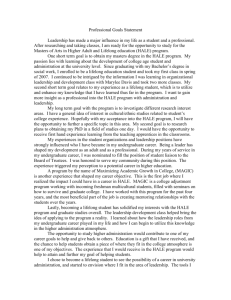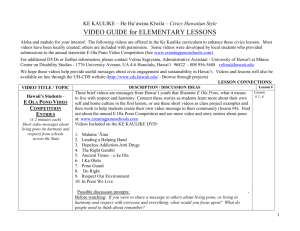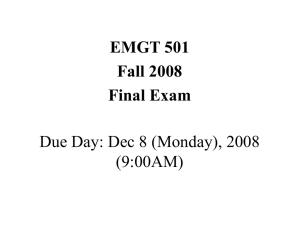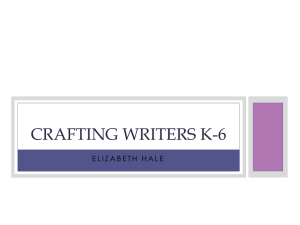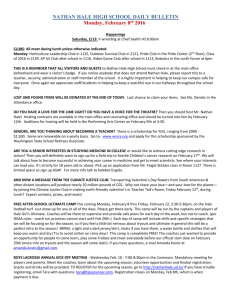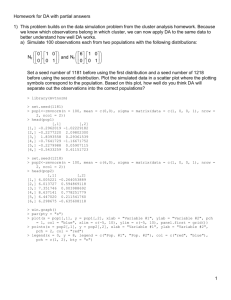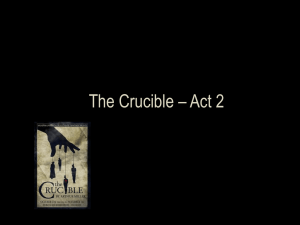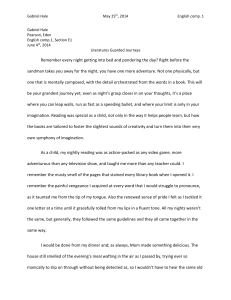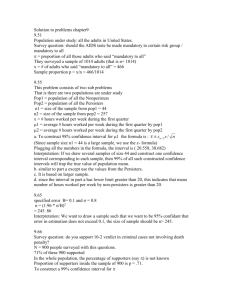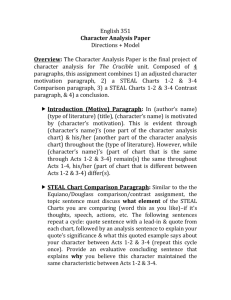1) Organizational Description
advertisement
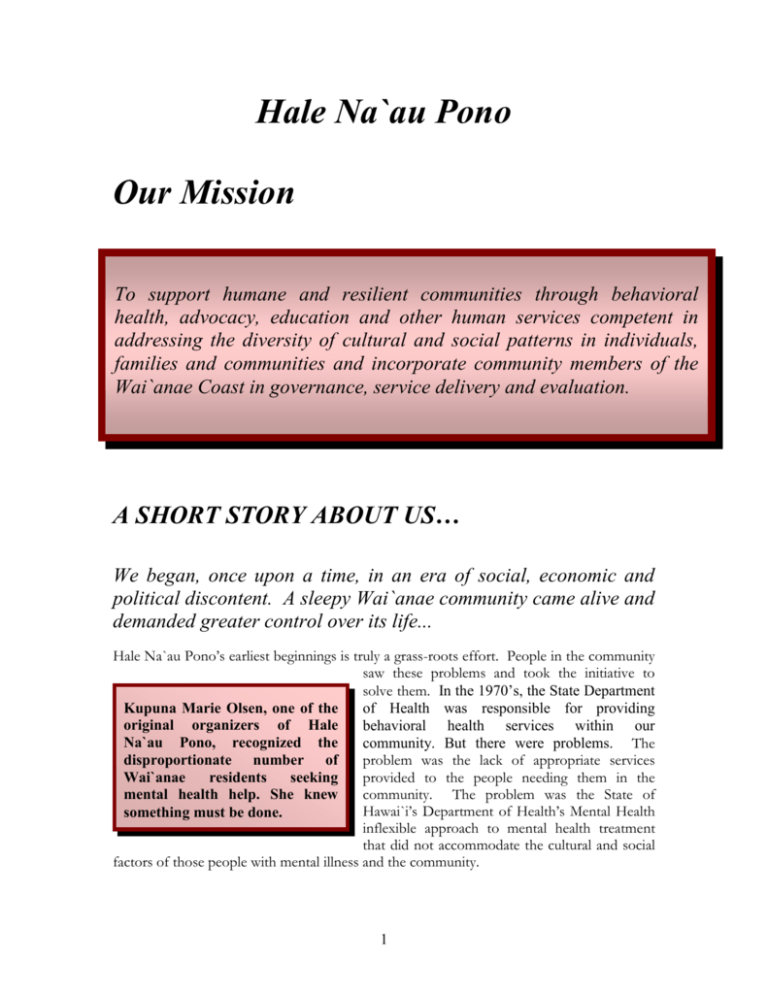
Hale Na`au Pono Our Mission To support humane and resilient communities through behavioral health, advocacy, education and other human services competent in addressing the diversity of cultural and social patterns in individuals, families and communities and incorporate community members of the Wai`anae Coast in governance, service delivery and evaluation. A SHORT STORY ABOUT US… We began, once upon a time, in an era of social, economic and political discontent. A sleepy Wai`anae community came alive and demanded greater control over its life... Hale Na`au Pono’s earliest beginnings is truly a grass-roots effort. People in the community saw these problems and took the initiative to solve them. In the 1970’s, the State Department Kupuna Marie Olsen, one of the of Health was responsible for providing original organizers of Hale behavioral health services within our Na`au Pono, recognized the community. But there were problems. The disproportionate number of problem was the lack of appropriate services Wai`anae residents seeking provided to the people needing them in the community. The problem was the State of mental health help. She knew Hawai`i’s Department of Health’s Mental Health something must be done. inflexible approach to mental health treatment that did not accommodate the cultural and social factors of those people with mental illness and the community. 1 The State’s services were insufficient, often requiring residents to travel outside the community for treatment. The State finally moved a service office into the community. Kupuna Marie Olsen of Nanakuli sat for a week in the reception area and counted only 3 clients served, out of a community population of 40,000 people. Something had to change! Community leaders organized to invite the State’s Mental Health Division to leave the community and let the people create and manage their own mental health services for the Wai`anae coast. In 1978, the State agreed services in the Wai`anae community were inadequate. Through a coordinated effort with the assistance of the University of Hawai`i School of Medicine, the Wai`anae Coast Community Mental Health Center was spun off from the State system, as an independent, private, not-for-profit corporation community mental health center (CMHC). A transitional period of separation from the Leeward District began. In 1986, we were incorporated as the Wai`anae Coast Community Mental Health Center. A major grant from the Robert Woods Johnson Foundation was given to us to become a “demonstration model” of a transformed system of mental health practice. In 1987, we began providing services to the community, and since than has continued to survive and thrive, providing today, the broadest array of services of any out-patient community mental health center in the State of Hawai`i. Almost 10 years later, with the help of the State Legislature, the Harry and Jeanette Weinberg Foundation, and other community donors, we constructed and moved into our own two-story facility along Farrington Hwy. from our cramped quarters at the Wai`anae Satellite City Hall. By January 1995, we became the first private, not for profit mental health center in Hawai`i to receive national accreditation by the Commission on Accreditation of Rehabilitation Facilities (CARF). Presently, we are celebrating our fifth, three-year accreditation from CARF. Of all the community mental health centers across Hawai`i, we are the only one which is nationally accredited. Between 1995 and 1998, we more than doubled our staff and tripled the amount of people served annually. In 1996, the agency moved out of a cramped, 800 square foot rented facility into our own two-story building. Our spacious new facility, the Harry & Jeanette Weinberg Building, facing the Ocean, was symbolic of our limitless potential born of persistence and perseverance. Today, we service the community, not only from the Weinberg building, but also from a number of satellites within the community. Hale Na`au Pono, a Hawaiian name interpreted as, “The House of Inner Balance,” appropriately identifies our agency to the community and to the state. 2 Hale Na`au Pono receives the prestigious Managed Behavioral Healthcare Leadership Award sponsored by Eli Lilly Company and the National Healthcare Congress. Hale Na`au Pono is operated by a staff of employees and volunteers numbering over 150 people, over 50% of whom reside in the Wai`anae community. They represent a variety of professional and non-professional positions. Over 10 percent, including program heads, have been or remain under treatment for mental illness, demonstrating that mental illness is not insurmountable, and under proper care, a person can function effectively within the broad society. Hale Na`au Pono is governed by the Board of Directors whose members either live or work in the Wai`anae community. Pōkā Laenui, Hale Na`au Pono Executive Director, has lived in the community over 50 years. In 1999, the National Health Care Congress recognized Hale Na`au Pono’s methods of treatment, integrating family life, education, cultural appreciation, respect for the environment, pharmacology, history and genealogy. Hale Na`au Pono was named the best organization in the nation with an annual budget under $10 million (we operate on an average of 4 million). Today, Hale Na`au Pono is the only Community Based Mental Health Center not operated by the State of Hawai`i. We provide the most comprehensive array of services than any other center in Hawai`i ranging from Case Management, Therapy, Nursing and Psychiatric services for adults across an array of programs including Outpatient services, Community Based Case Management (CBCM), and Assertive Case Management (ACT). We also provide a clubhouse program and an Alcohol and Other Drug program for the community. In our children and adolescent team, we have our Therapeutic Foster Home Program with 25 homes dotting the community from Makakilo to Makaha, and into the valleys of Wai`anae and Lualualei. Hale Na`au Pono is setting the pace for a variety of related services including housing, employment training, diversion and legal representation in Special Education. We have begun to host an Independent Living-Adolescent Group Homes for Boys 16 to 18 years old, Independent Living-Adolescent Group Homes for Boys 18 to 21 years old, and a Developmentally Disabled/Mentally Retarded Care contract under DHS. We are ever expanding in our services to children and adolescents. We operate a Neighborhood Place program, Ka Wahi Kai`aulu, that acts as a diversion program from CPS, as well as family support and training in general. We also have another contract under the Blue Print for Change program of the State Legislature administered by the DHS. We have an innovative Smoking Cessation program, one-of-a-kind, targeted specifically to the seriously mentally ill population. Programs and services provided by Hale Na`au Pono are community-based, integrated, and focus on the strengths, preferences, abilities, and needs of the person served. It is the belief of Hale Na`au Pono that by empowering and enhancing the life of one individual, the whole community is empowered and enhanced. Hale Na`au Pono service satisfaction has been documented annually in the AMHD’s Consumer Satisfaction Annual Reports in which consumers have consistently expressed 3 satisfaction with services received. Hale Na`au Pono has continued to demonstrate satisfactory performance with all contracts. Consultants advising the AMHD have also recognized Hale Na`au Pono’s achievements. For example, on March 30, 1998, in a report by the Technical Assistance Collaborative (TAC) of Boston to the AMHD, the following was stated, “We were most impressed by the knowledge of staff at the Wai’anae Mental Health Center with regard to their patients who are currently in the hospital (HSH), as well as those who have been discharged. We also found that the discharged patients we tracked are living in clean, safe, and attractive environments and are receiving appropriate care in the community.” On March 11, 2002, Hale Na`au Pono hosted a visit by a special panel from the Department of Justice charged with advising Federal Magistrate Judge Chang on the development of a Remedial Strategic Plan for community services. This panel has also visited Hale Na'au Pono on subsequent visits to the State of Hawaii. The special panel selected Hale Na`au Pono due to its positive reputation in the mental health community and for its culturally responsive services. Similarly, Hale Na'au Pono was visited in 2004 by Dr. Kenneth Minkoff, a renown psychiatrist and special Federal court monitor appointed to monitor the progress of the State in meeting the requirements set out by the court. Dr. Minkoff also commented that he was interested in visiting Hale Na'au Pono due to it's reputation for providing services uniquely tailored to the cultural needs of the local community. In his exit interview in December of 2004, Dr. Minkoff cited with favor the high quality of work he found at Hale Na`au Pono in its ACT services as well as the on-going development of additional group home beds. 4
